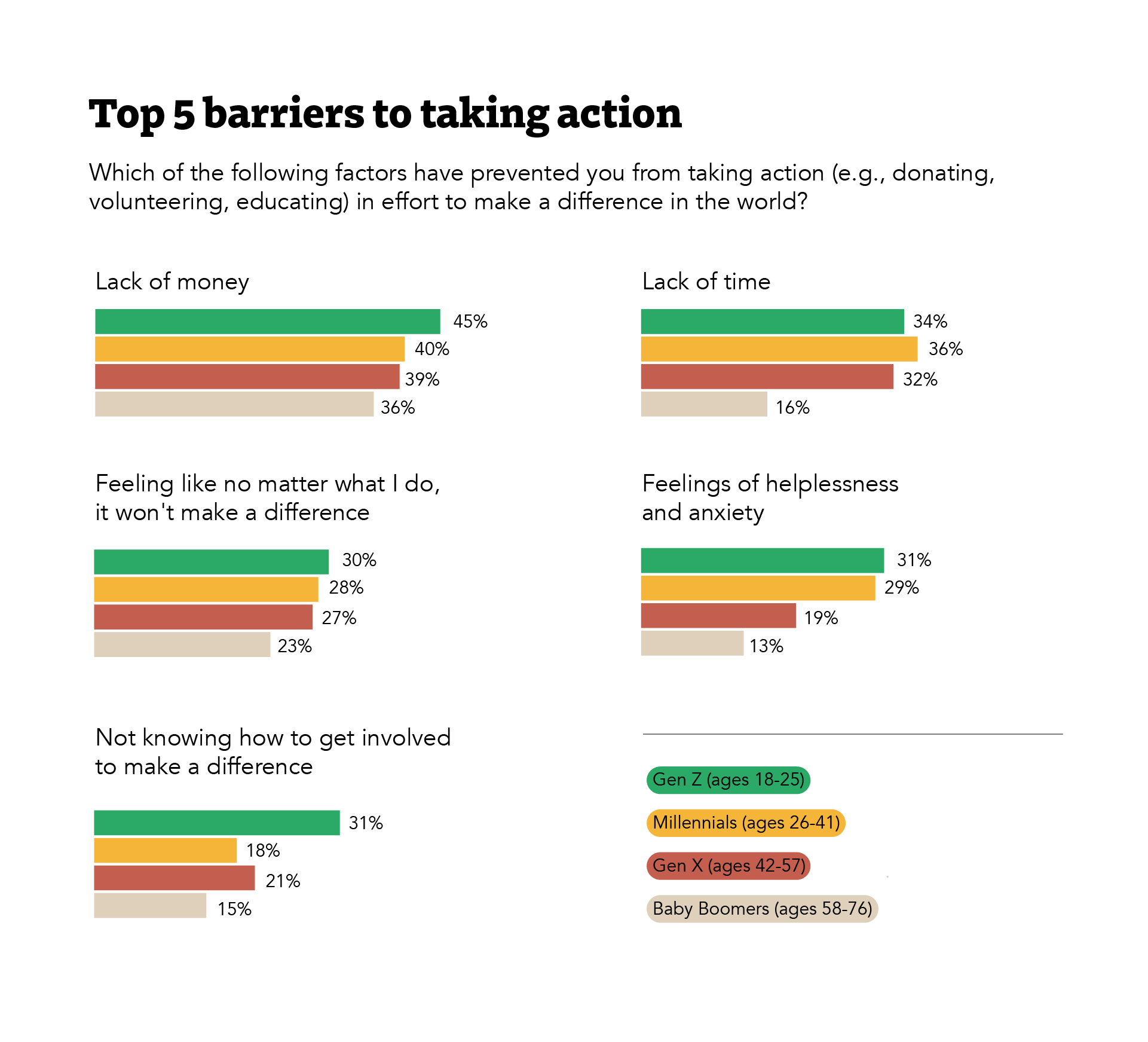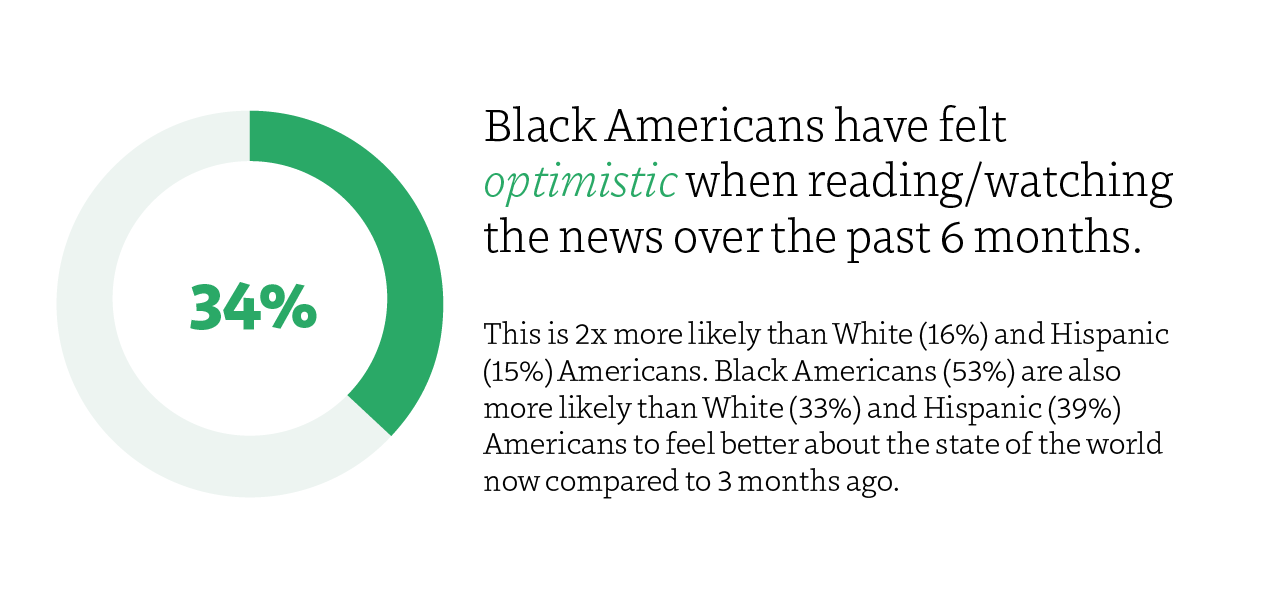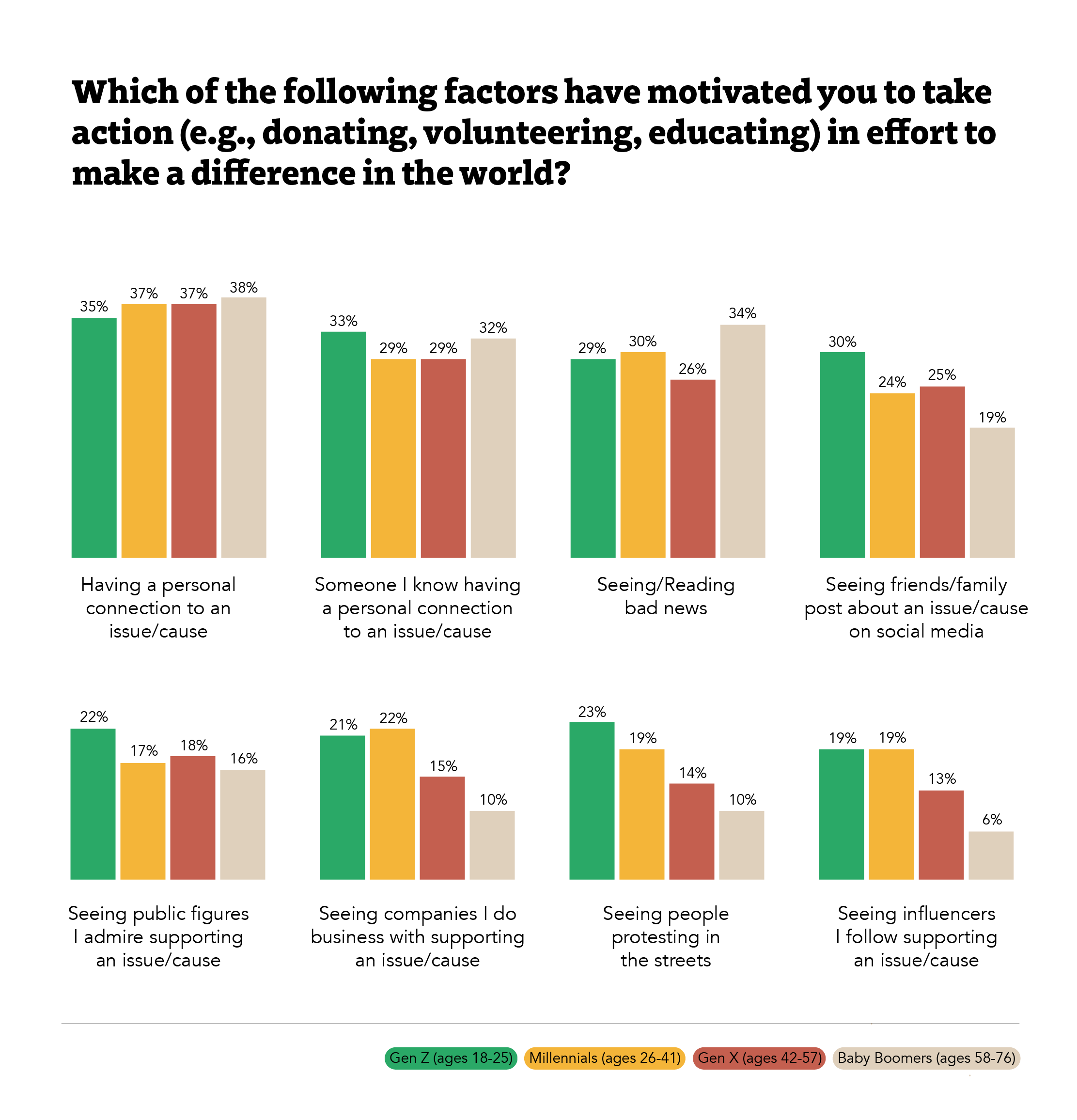Kiva commissions a national, multi-generational survey to learn how Americans are motivated to make a difference in the world.
Between the pandemic, uncertain economic climates, political volatility, and war in Europe, many people feel called to take action to help others. But how exactly are Americans thinking about making a difference in the world? We recently commissioned The Harris Poll to survey more than 2,000 Americans on the state of altruism to better understand what motivates them to help others and what barriers prevent them from doing so.
Here is what we found:
- Most Americans believe that their individual actions do matter, but physical barriers like money and emotional barriers like helplessness and anxiety prevent them from taking steps to make a difference—especially for younger generations.
- Current events and bad news cycles contribute to the negative emotions that hold people back.
- Of the U.S. population, Gen Z adults are most likely to say reading/watching the news over the past 6 months has motivated them to help others, but this generation is also most likely to say they are prevented from taking action because they don’t know how to get involved.
- Across the board, more Americans feel taking private, personal actions like educating themselves and making lifestyle changes are most effective when it comes to making a difference versus taking external, public actions like volunteering or sharing on social media.
- Personal connections rather than public influencers are more likely to inspire Americans to take action to make a difference in the world.
Read on for the most important trends from our State of Altruism pulse.
Broke Altruism: Younger generations are more likely to say donating money is one of the most effective ways they can make a difference, despite lack of funds
Altruism is made possible when people feel they have enough resources to share with others – whether that's time, money or emotional bandwidth. Our survey found that many — especially younger generations — are experiencing what we’re defining as ‘Broke Altruism’: care and interest in helping others, but not having the resources to do so.
A majority of Americans (79%) believe their individual actions make a difference in the world, with only 21% disagreeing, and yet, when we asked what is preventing them from taking an action like donating or volunteering, lack of money (39%) was the top barrier cited. That’s partly because money is seen as one of the more effective tools to help. Gen Z (ages 18-25) and Millennials (ages 26-41) are more likely to say donating money is one of the most effective ways for them to make a difference (37% of Gen Z & 33% of Millennials vs. 25% of Gen X).
As well as being held back by lack of funds (45% of Gen Z & 40% of Millennials), many among the younger generations say experiencing feelings of helplessness and anxiety (31% of Gen Z & 29% of Millennials), and not knowing how to get involved to make a difference (31% of Gen Z & 18% of Millennials) have prevented them from taking action to make a difference in the world.

While the impact that negative emotions have on giving may be surprising, less surprising was the perceived barrier created by a lack of funds. While they may have less to give, Gen Z can use 'Broke Altruism' to find ways to create more impact with less. This is something that Kiva's crowdfunded microloans have provided a solution for since 2005. By crowdfunding or ‘crowdlending’ smaller loans from many individual lenders, Kiva lenders have helped nearly 5 million borrowers. Our data shows that 70% of loans on Kiva are made with just $25, which has added up to $1.2 billion in loans to change individuals’ lives around the world.
Millennials are most likely to think donating money is for the privileged and wealthy
After navigating multiple recessions, often being saddled with student debt, and still struggling to achieve the economic prosperity of their parents’ generations, 57% of Millennials agree with this statement: “Donating money is for privileged (i.e., wealthy) people” (compared to 47% of Gen Z, 43% of Gen X, & 27% of Boomers). Nevertheless, 57% of Millennials also note that donating money to a cause or organization helps relieve stress for them (compared to only 39% of Baby Boomers).

 In contrast, nearly three-quarters of Baby Boomers (73%) disagree that donating is for the wealthy and privileged. White Americans are less likely to agree that donating money is for the wealthy than Black and Hispanic Americans.
In contrast, nearly three-quarters of Baby Boomers (73%) disagree that donating is for the wealthy and privileged. White Americans are less likely to agree that donating money is for the wealthy than Black and Hispanic Americans.
Reading the news spurs Black Americans to action
It should come as no surprise that watching and reading the news is having an adverse effect on people’s emotions — almost half of all Americans (46%) say they have felt angry about what they have read/watched in the news over the past 6 months, 43% have felt depressed, and 39% have felt anxious.

Despite this, Black Americans are more likely to cite having felt optimistic compared to additional racial groups (34% vs. 16% of White Americans & 15% of Hispanic Americans) and motivated to take action (28% vs. 18% of White Americans). A slight majority of Black Americans (53%) feel better about the state of the world right now compared to three months ago, whereas only one-third of White and 39% of Hispanic Americans feel that way. Black Americans are also more likely to report feeling stress relief from donating money to a cause or organization — 64% compared to 48% of Hispanic and 46% of White Americans.

Given the motivation to help and the perceived positive emotional benefits of donating, there’s a big opportunity to catalyze more impact among Black communities.
Social media influencers aren’t as effective at motivating people to help others
Social media influencers may have huge power over consumer buying habits, but our survey data found they have less power to inspire people to make a positive impact in the world. Only 19% of Gen Z and Millennials say seeing influencers they follow support a cause/issue has motivated them to get involved. Contrastingly, 35% of Gen Z and 37% of Millennials say they have been motivated by having a personal connection to a cause/issue. The trends are fairly consistent across generations.

How to make a difference with less
What do the results tell us about how to make a difference with less and how we can inspire people to help others? There are a number of key takeaways:
-
Stay positive. While some people are motivated by seeing and reading bad news, we also know that feelings of helplessness and anxiety are a big barrier to taking action. The world is facing some big problems, but a lot of people are doing good things to address them. Reframe the news that you share to help people feel more optimistic and empowered.
-
Tell your stories. People are more likely to be moved to take action on issues if people in their circle have been talking about them or are personally affected. Talk to the people in your network about the issues that impact you and people you love. Share with them the actions you’re taking to make a difference.
-
Take action. While most Americans think the most effective thing they can do to make a difference is to get educated on issues, awareness only goes so far. Real change takes action. The Gen Z generation, who will be around dealing with the world’s issues longer than most of us, understand this acutely. They are more likely than some of their older counterparts to feel the most effective ways to make a difference in societal issues/crises are to volunteer, donate and protest. Taking action can also have emotional benefits—our survey results show that donating, at any dollar amount, can relieve stress and address feelings of helplessness.
Consider donating here to help further Kiva’s mission to open financial opportunity for all.
-
Give — even just a little. One of the main things keeping people from taking action to make a difference is lack of funds. But even small amounts of money can have an impact. For instance, most of the approximately two million lenders using the Kiva platform to fund small businesses in underserved communities contribute $100 or less, with most contributing $25 at a time. For recipients of donations and investment, many small sums add up and have a big impact on their financial situation and their future. Plus, as you’re repaid, you can lend the same money again to change another life.
-
Consider the impact privilege has in perpetuating inequities and injustices. The results indicated that Black Americans are spurred to action by the news, and are even feeling more optimistic, despite systemic inequities that can affect their lives specifically. If we are going to address society's problems, it needs to be a collective effort and people need to get involved regardless of privilege to truly make a difference.
Even without much money, we have the power to change the world. We thrive through our connections with each other. Together — one person at a time — we can make a difference.
About the methodology
This survey was conducted online within the United States by The Harris Poll on behalf of Kiva from September 22-26, 2022 among 2,044 U.S. adults ages 18 and older. The sampling precision of Harris online polls is measured by using a Bayesian credible interval. For this study, the sample data is accurate to within +/- 2.8 percentage points using a 95% confidence level. For complete survey methodology, including weighting variables and subgroup sample sizes, please contact media@kiva.org.
About Kiva
Kiva is a global nonprofit, founded in 2005, with a mission to expand financial access and help underserved communities thrive. Kiva unlocks critical access to capital for borrowers through crowdfunded loans supported by individuals around the world. Kiva Capital Management is an impact-first fund manager leveraging Kiva's deep microlending experience, which manages private investment vehicles like the Kiva Refugee Investment Fund for qualified investors that want to deploy larger sums of money to create impact. Through Kiva, over two million people have invested $1.7 billion in real dreams and real opportunity, spanning more than 70 countries and 4.2 million borrowers.
PREVIOUS ARTICLE
Why donate to Kiva? →NEXT ARTICLE
How a seasoned restaurateur built her latest success with help from a Kiva loan →














